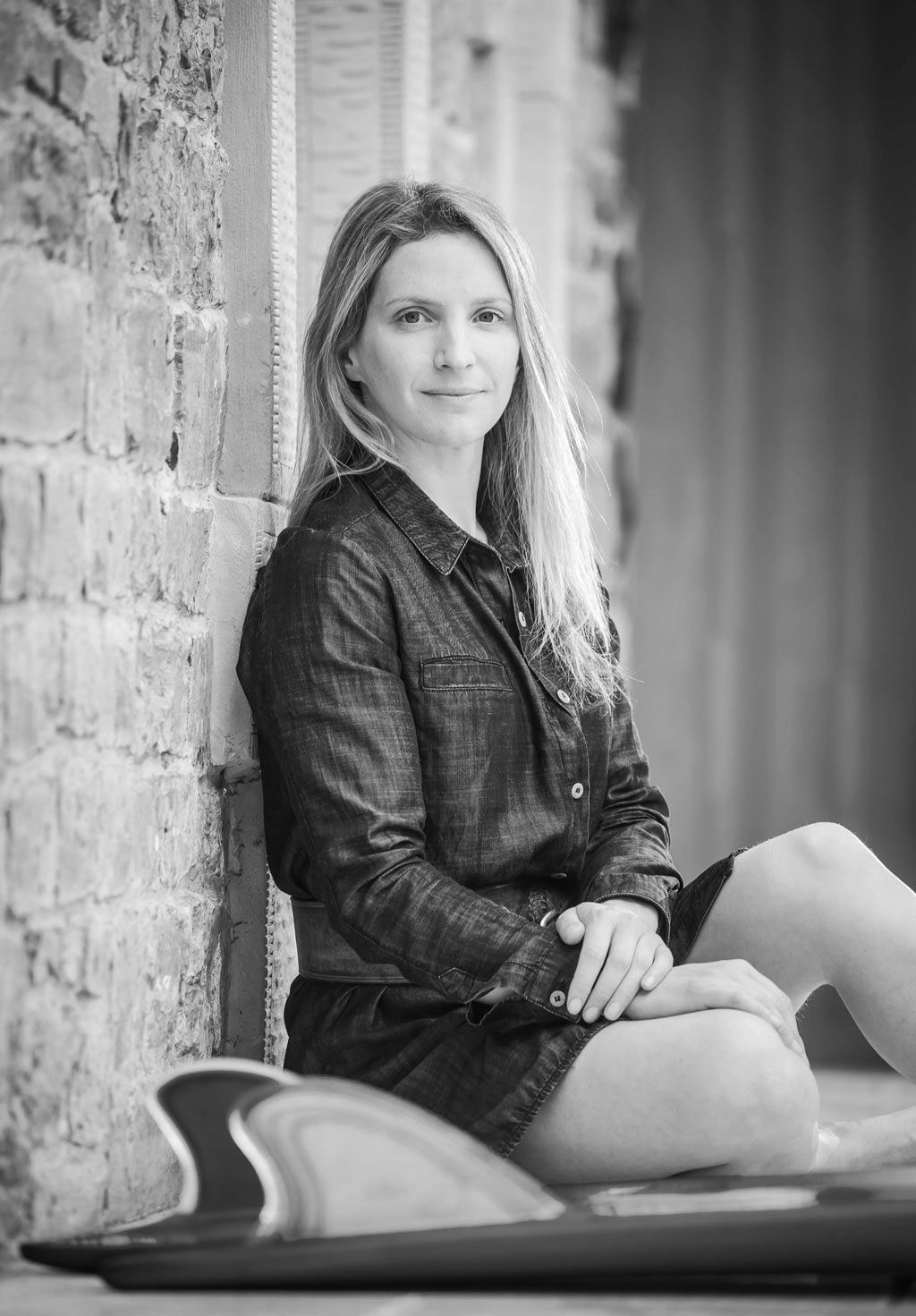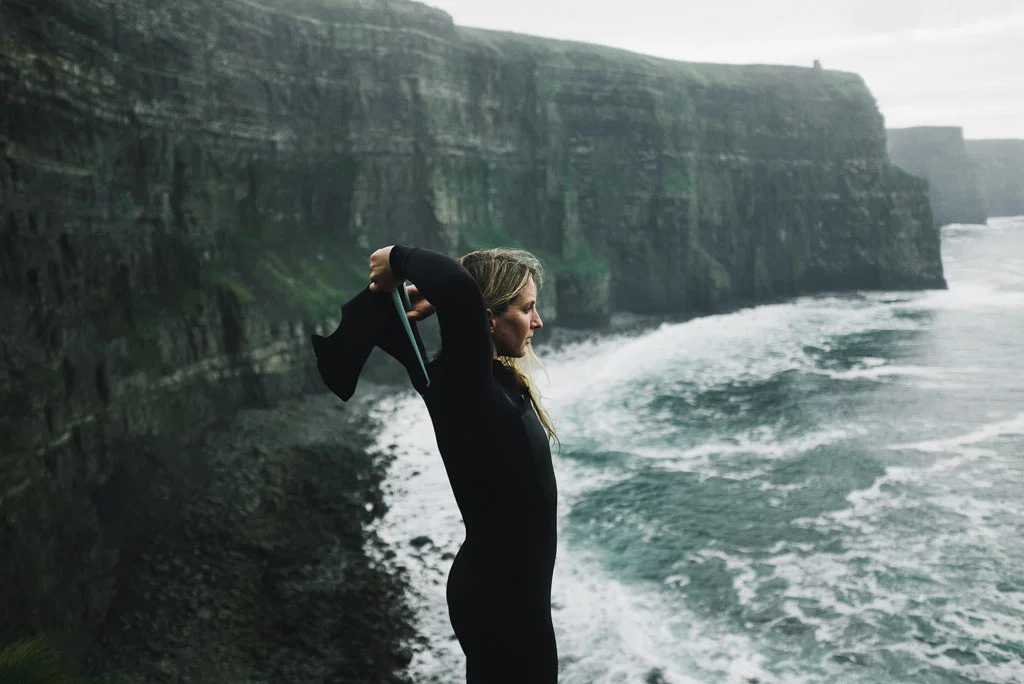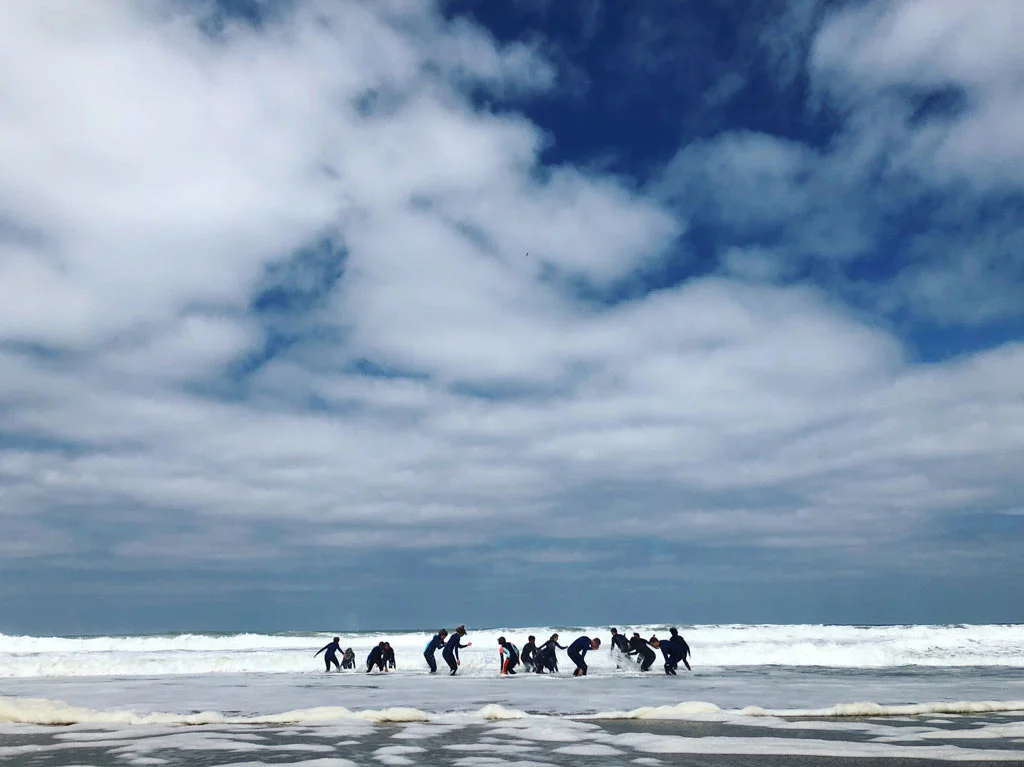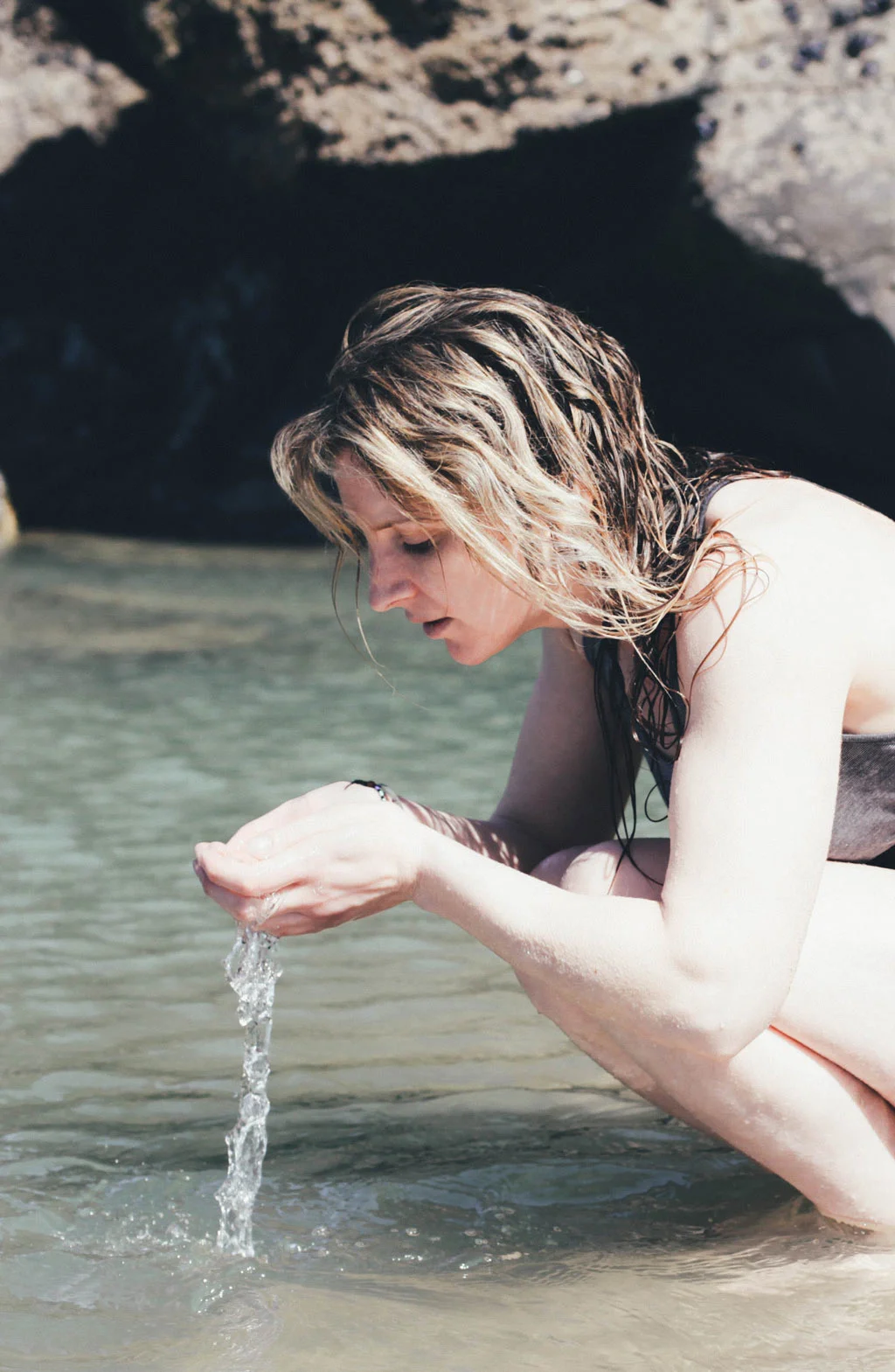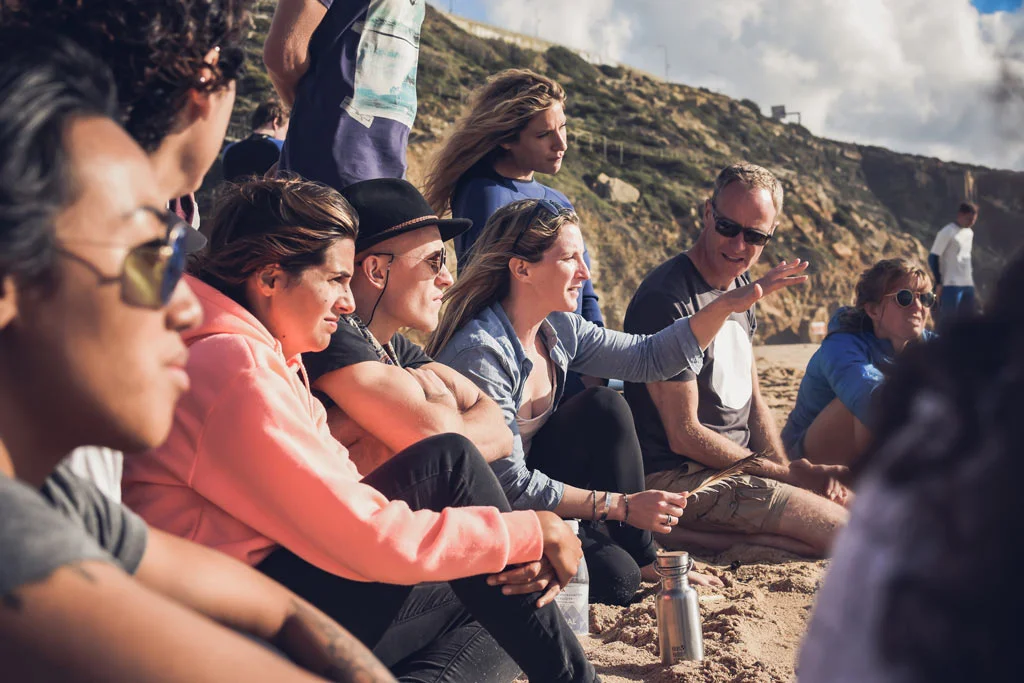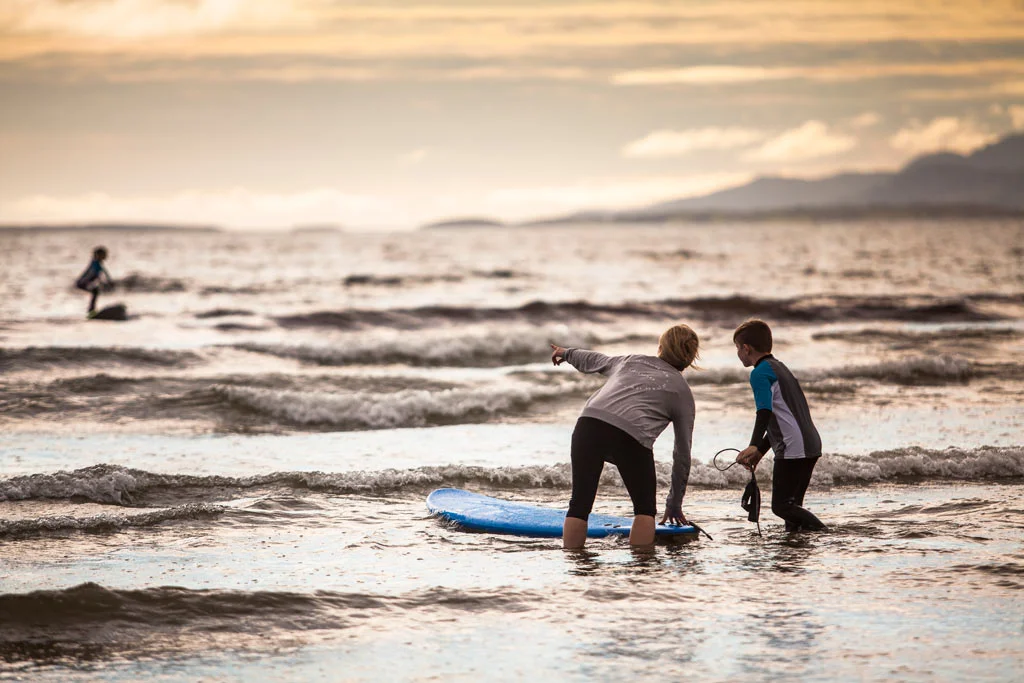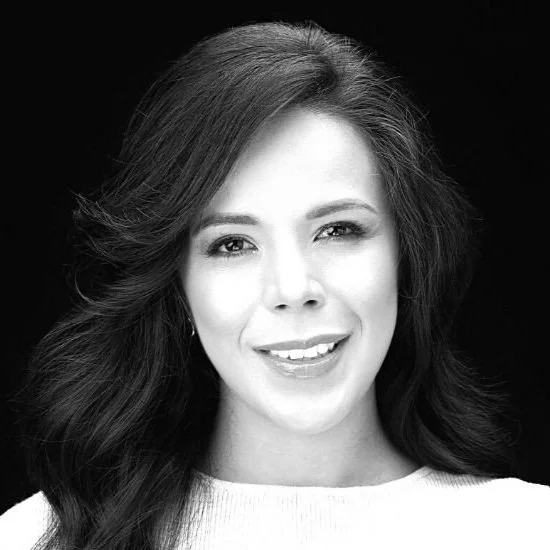Dr. Easkey Britton On The Ebb & Flow Of Life As A Changemaker & Adapting To Shifting Environments
Dr Easkey Britton is a social ecologist with a PhD in Environment and Society. Her work explores the relationship between people and nature, especially water environments. As a research scientist at the National University of Ireland Galway, she contributes her expertise in blue space, health and social wellbeing on national and international research projects including the EU-funded Horizon2020 project on Seas, Oceans and Public Health in Europe (SOPHIE).
A life-long surfer, her parents taught her to surf when she was four years old and she channels her passion for surfing and the sea into social change. Her work is deeply influenced by the ocean and the lessons learned pioneering women’s big-wave surfing in Ireland and introducing the sport of surfing with women in Iran, which led her to be invited to give an inspiring TEDx talk: Just Add Surf. Passionate about facilitating creative & collaborative processes, she designs and delivers global leadership events specialising in experiential learning, nature connection and social impact, including the annual Wavemaker retreat.
Easkey discusses her experience as a professional surfer and scientist, unpacking strong perspectives into the human-water connection, lessons to be learnt from the ocean, and entrepreneurial burn-out.
Highlights from the interview (listen to the podcast for full details)
[Nikoline Arns] - Easkey, thank you very much for joining us for the Fixing the Future festival in Barcelona. To start things off, could you please share a bit about your background and what led you from surfing to getting a PhD?
[Easkey Britton] - It's not a short story. What led me into the sea and surfing, was I guess my place of birth. I had the good fortune of being born on the northwest coast of Ireland in Donegal, just minutes from the beach. Although most people don't really associate Ireland with being a surfing destination. But I was also born into one of the pioneering surfing families in Ireland. Both my parents are, and my dad and his brothers were some of the first surfers in the northwest to start the sport in the country. And then even my grandparents were quite influential in helping set up the first surf club and they have the longest running surfing event that we still have, to this day it’s been going for over 50 years. So, it was really part of my heritage, this connection with the sea and growing up with that with just felt like a normal part of our life.
When you're that connected to something like surfing, you're completely at the mercy of what the elements are doing, the weather patterns, the sea, because it's always changing. So there was that lovely early lesson in fluidity and how to adapt to changing environments and all these things.
Now that I can see play out in my my whole life path. But really initially it was just that simple kind of joy. It was a place to really play. The sea became my playground. I learned to surf when I was about four years old, or at least that's when I first stood up on a surfboard, but I've been in the sea for longer than I can remember and always felt really at home there. It's just that really strong sense of belonging, and that's the place, to be able to be fully who I am. And it's interesting then when I follow this path and the surfing to a PhD.
I know it's quite a stretch.
Well, in one way, but then it seems completely natural to me because the influence of the sea was so strong. It's where I go to feel most alive. It's where I got my inspiration from. It's where I destress, it's where I escape. It's also where I learned an awful lot about what's going on in the world around us. And so it's also fed that sense of curiosity, in particular for the natural world and our connection with the environment around us. So that sensitivity, was very powerful for me early on because I had that exposure as a child, which I'm so grateful for. And then that sea obsession; it comes like an addiction and has followed me throughout my life. I think because you're really immersed in an environment like the sea, over the course of your life, you become more aware of the changes and impact.
So when we talk about things now that are in the popular media, and getting a lot of attention around marine pollution, ocean plastics, and you are at the forefront of witnessing that; you're in it every day and you're completely aware of how personally affected we are by changes in the marine environment. So picking up things like different infections or illnesses from water pollution, and experiencing beaches that are closed and competitions canceled because of sewage outbreaks. So I guess doing the PhD was really to deepen that desire to want to better understand those interactions and the relationship we have with the sea and our health in particular. So I started. Like most things in my life, I cannot stay on the surface for very long. I wanted to go deeper and deeper and deeper. So for better or worse, I ended up going all the way down the dark hole.
It’s a nice contradiction with surfing when you are on the surface…
Yeah, you are on the surface. You often get tossed around as well. But [the ocean is a place where] I find out where the the edge of my knowledge and skills are. I feel like the ocean is a great place to test that because, you never really get a handle on it because it's always changing and it will surprise you in an instant.
What's the thesis of your PhD?
When I finished school, I was surfing all through my teenage years and competing. I finished school, I was 17, and then decided to really focus my energy on creating a career around professional surfing.
But at the same time I wove in wanting to get more life experience on what I was interested in, which, at the time in particular was around marine conservation. And so using the ability to travel and compete in surfing as a vehicle to actually explore these other interests. I did that for quite a few years before I went to university and I studied environmental science. I've always kept surfing, competing and studying at the same time and that's been challenging, but also I think, an important balance for me is to always have that passion feeding what I do in my work. I didn't plan on doing a PhD, but like most things in my life, just be open to the unexpected.
In this case I had a really lovely mentor and teacher, my lecturer, Dr Sarah Coulthard at the University of Ulster where I was doing environmental science. Her work looks at that relationship between people and the sea, particular coastal communities and how our sense of wellbeing is effected when we lose that connection. She was writing up this PhD [proposal] at the time looking at that social wellbeing impacts in fishing communities in Northern Ireland, because there were a lot of fisheries being closed down. Until that point, the impact is only (and still), largely is considered in economic terms, and economically speaking near the fishing fleet is seen as really, a drop in the ocean. And yet it's very a powerful part of the fabric of communities identity. So in my research, you find that a lot of the consequences in terms of that kind of sense of community cohesion, family relationships, sense of self worth and mental health is really impacted. And it was a real hidden impact, of losing that connection.
And talking to what are we talking about later, fixing the future, is about this capturing impact and the emphasis on measuring impact. And I see that in both for, NGO's and organisations and then research and academia, but also this equal or even more important part of the importance of those stories that bring that to life.
The work I did with this was very mixed, in that it was very qualitative, but also trying to capture the measurement and create the data that would speak to policy with an impactful graph. But if you didn't have the story to really back that up or bring that to life, then it doesn't really move people. There's no emotional connection to it. And I think you need both.
Do you see yourself more as a scientist or as a social entrepreneur?
I thought this was a really good question because I see myself more as a scientist, but I am not even sure if I see myself as a scientist either. But I see my attraction to science is, how can we deepen our understanding?
The real power in science is how you translate that knowledge into action. Like the application of it in a really grounded way. So I really see that linking bridge between science and social enterprise, science and activism, science and art. That's where the actual and meaningful impact will happen and how we manage to translate that. And I think there's still a lot of work to be done.
Over the years you have created various creative platforms, Like Water, the Wavemaker Collective and the Ocean Collectiv. Could you please tell us more about these? What is their purpose and where do you see these in five years time?
It's amazing. I've been tracking the emergences as well of these different initiatives. I suppose what drives me is the desire to better understand how an extra could be linked. Our health and wellbeing is with the health of the ocean and also that sense of how we might overcome that disconnect that we're experiencing in society, in particular from our natural world that has all these knock on consequences for our own health but also the health of the environment. I think these initiatives in collectives are trying to break out of the traditional ways of thinking, and doing and approaching these challenges and issues and recognising the need for collaboration across different sectors, across different disciplines. And I'll start with with Like Water. To be perfectly honest. It's like my own little kind of creative sandbox where I get to play with these ideas and inspirations, or insights I get from the scientific work that I do. And wanting to play with how to apply that in a setting; the embodiment of how we bring to life the scientific understanding we're beginning to get about how the ocean influences us, and how it has a positive impact on our wellbeing.
So "Like Water" came about as a way to creatively explore and create these experiences to help connect people directly. And in a really immersive way with the natural world around them. In particular with water and especially Like Water, which focus is more with women, to explore ways of connecting with our bodies through water, because it's such an awakening environment. But it's also really in the work that we've done at various workshops and retreats, including one last year called Move Like Water. There's an interesting relationship we have with water and we're both really drawn and attracted to it as humans since human history began.
But there's also a fear and there's a danger associated with water that's very real. But when you turn those spaces into a more safe space, it's just incredible the transformation that can happen. And this sense of being held comes up. It's powerful that water holds us. So that's been really wonderful to play with that. The other purpose of Like Water is to start to tell those kinds of stories about our relationship with ourselves, our bodies, water, each other. But the other side of it I created as a way to just better facilitate collaboration and partnerships with other people who are doing pretty cool work in this. That's how the Wavemaker Collective came about, which is this creative leadership retreat that I run in partnership with two friends of mine, who also have their other amazing ocean related projects, because we felt it was just such a powerful learning medium for creative insight.
When we take ourselves out of our everyday environment, which is typically indoors, ideally into nature and learning through being immersed in the sea and surf and nature and combining that with different tools. Then from design thinking and brainstorming and peer learning, but find, it's just such a great facilitator of connection when you take people a little bit out of their comfort zone. It's amazing how your guard just drops. And the first exercise we do is the one we call "wave play" on the very first day. So Wavemakers is aimed at different leaders, entrepreneurs, social activists; a very diverse spectrum. And some people surf, some people don't. But it's really aimed at how to create more social impact in the work that you're doing. So you have this very diverse mix of people who don't know each other. It's a group of about 16, and with this wave play activity, it's amazing what happens. Essentially it’s jumping in the surf and body surfing. So no surfboard, no anything; just yourself and the waves and it's just all about play. It's such a great leveller if you're going in doing what you did as a kid getting tossed around by waves, feeling that kind of energy move you. And this incredible connection and trust happens in the space of this hour that we spend in the water. That's great. It's really, really fun.
So that's just a great way to address the other issues that exist in this space when we're trying to create change and social impact is, a lot of people, especially who come to the Wavemakers, are at the vanguard and what they do. And that's a really isolating place to be.
So it's also a chance to create that support and connection. So hence the collective part. And then add time and space just to let go and be in nature as well.
"Ocean collectiv" was founded by a friend and marine biologist Ayana Johnson. It's really an amazing collective largely of female scientists and experts in that ocean space. It's a consultancy for ocean solutions in a way to help a whole diverse mix of organisations and businesses and social enterprises to better address these ocean challenges that we're facing. It’s a really lovely mix of skills and women, and a lot of us are doing our own powerful work in our own fields or areas, but it feels just really nice that we have this collective and that by coming together and sharing the skillsets, it's just a lot more powerful. Creating these different spaces for opportunities for collaboration wherever you can find them and create them.
And that's what really gives me that the energy and encouragement I sometimes need. In the academic work I do, it can get really intense and sometimes you can think ‘what's it all for?’ So these things really breathe life into that research work I do. It ads, more purpose.
Yeah. And you're not alone. You can find communities.
Increasingly it’s happening in research and academia. I love that there's a lot of talk about interdisciplinary research, but more and more over the last 10 years I've seen that happen in reality and something like the SOPHIE project: on oceans in human health which is supposed to be trying to better understand and explore those links and interactions between human health and ocean health, but that's bringing together a really diverse mix of scientists, people from the medical and public health backgrounds and biotechnology and environmental psychology, behavioural change and brain science.
Since you began working with communities, what insights do you have about grassroots movements, and how to best foster a community or collective to really make change happen?
I think that's what we're trying to discover and experiment with. Creating something like the Wavemaker Collective and appreciate that it's only on a very small scale and we have a small retreat of just 16 people, and that was intentional because you really wanted to foster that connection. But what's interesting over the course of the last three years that we've been doing it, is seeing how there's this ripple effect, and how beyond those four or five days that we have, the conversation continues, the people start collaborating with each other on a whole mix of projects. And in recognising again, this power of the ocean to create connection, if a safe space and enabling space is created.
I also appreciate that there are so many issues with accessing these experiences to that I'm talking about with nature and the sea and the beach, and that we're just beginning to wake up to the fact that it's not open to everyone and that these experiences, and our ability to access them, are really determined by and shaped by our history, where we grew up, or race, or ethnicity, or gender. And that became very real to me in somewhere like Iran. So the opportunities I had growing up in Ireland to have such a positive experience of myself in nature and in the sea is not available to everyone. But if you do create more of those spaces and opportunities cross culturally in particular, it's incredible what can happen. So what we discovered was there was the importance of creating these positive experiences, impact on wellbeing in building confidence and trust, connecting with their bodies.
And then another young woman came to the Wavemaker retreat last year. Martina and her friend Amanda went on to set up, Sea Sisters an initiative in Sri Lanka. Martina’s done a Masters as well. And I think it’s one of the first Masters thesis to look at the role of surfing and women's empowerment in developing nations. So she had been following my work in Iran, then she came to the Wavemakers and she took this initiative herself with the work she’d already been doing in Sri Lanka to create this program. What I love about it is that it's reclaiming that ocean space as a safe space for women and girls to create that sense of empowerment. And in particular, where there's been that trauma associated with the tsunami, loss of life, huge fear. And actually, the overwhelming number of deaths, were women and girls because they don't have access to basic water safety skills or knowledge.
It is just wonderful that they're opening up another space of possibility for women to discover themselves in new ways. So yeah, I highly recommend checking Sea Sisters. It's really beautiful and they just set it up last year. They were also instrumental in setting up the Arugam Bay Girls' Surf Club; the first female run, female only surf club in Sri Lanka. And it's been recognised by the governing body. So it's amazing because traditionally the sea and the beach is not a domain for women and girls. I am aware too as a surfer when I'm traveling to these places like Sri Lanka or Indonesia, and the freedom I had to go and surf and have that opportunity as an outsider or tourist, and it just wasn't the case for women and girls who are from there. So it's wonderful to see these shifts happening.
What do you feel is the role of science in relation to social and ecological change?
It's essential, and there are a few things happening. There's this sense of urgency, (and I feel that more and more keenly), to act and then we need to take action and start working with what we already know to get going.
But at the same time, I don't think action alone will create change if you don't also cultivate a need to listen more deeply to reflect and reconnect with what it is that matters most. Otherwise we'll be acting without an awareness of what it is we want to create, which could be dangerous.
So really allowing for that space to reflect and allowing for new ways of noticing to emerge. So it's being able to remain really present, as well as focusing on the future and what needs doing.
I think the side role of science is to really help ground us in the sense of moving from a place of what we know and then being able to continue to reflect through asking those questions of why, what's this for?
What would you recommend for social entrepreneurs to get more in touch with science or universities?
I think the need goes both ways. We've just been talking about how in science there is such a need for better science communication. And there's some great examples of when those collaborations happen between science and social enterprise and with designers and with brand thinkers and all of that needs to happen a lot more.
The importance of science in social enterprise is helping to add value in where to impact and providing the evidence base, and tracking the change, and asking the right questions, so that we can understand what it's all for.
And then the other way is that, there's so much rich knowledge, incredible findings, expertise, all locked up in this science bubble.
We need to find better ways to communicate and turn those into stories that help move people to act, or that offer people even simple ways to begin to engage with creating their own change so that it doesn't feel so overwhelming.
And for that then we need to also collaborate with the design thinkers and social entrepreneurs to turn the scientific evidence into really cool and impactful stories as well.
Through stories and film and art and the visuals, they're so powerful because it's really hard to… we’re overwhelmed with all the information we're bombarded with, in the world today. So how do you infiltrate that or breakthrough?
How do you believe the business side of these projects helps to make social impact? Which are your main collaborators and partners and how do you work?
There's a couple of examples. One I'm really excited about, is with this amazing social enterprise called "Protect Blue" founded by Linzi Hawkin who actually is a co-founder of Wavemaker Collective as well. She is an amazing brand thinker leadership coach. She's passionate about marine education and social change but Protect Blue, what I love about it is that it's aimed at ocean advocates, the people doing the work to create change in the ocean space, but it doesn't focus on what the problems are in the ocean or what we need to be doing. She focusses on the people, on the ocean advocates and how through her skillsets and knowledge she can better help serve them. So these things we've been talking about like helping ocean advocates; understand and build the skills to better communicate the impact of their work through everything from web design and making videos.
She is running a 10 week online incubator program, bringing in a whole creative mix of teachers and thinkers to deliver these different modules, and ocean advocates and I'll be doing one on Blue Mind, which is a lovely concept that Wallace J Nichols initiated. He is a marine biologist who wrote a book of the same name. And it's linked to the research that we do. Blue Mind has become Blue Health and Blue Care and the importance of Blue Space. So it's like entering a Blue era, which is really cool. Protect Blue is a great example there. One of the other things that they're working on is creating a program aimed at people who are experiencing PTSD. And the first program is focussed with war vets in the UK. And with her partner in Protect Blue, Luke, they were wanting to design this experience through using the sea and water to create a sense of restoration and recovery and healing.
So we were both different by recognising the power of the ocean to heal. I'll be collaborating there just to help with the whole design of that program and how to capture the impact and that powerful change and transformation that happened. It'd be both through the storytelling, but also then looking at ways we might evidence that as well to measure it without reducing the experience.
Creating the maximum possible positive index can be challenging. What is your take on motivating people in collectives to take action? How do you navigate through obstacles? What is your piece of advice?
I'm finding increasing that people, (it's not for lack of motivation or energy), come back to that impulse to want to act, which is really great, but then there's the danger, (and we see it again and again in the biggest challenges leaders are facing when they come to something like the Wavemaker Collective), is how to balance and manage their own time and energy, how to not burn out.
And so there's this crisis of, I hate to use the words ‘self care’, but that's what it comes down to when pouring so much energy and passion into how to better care for the planet, or the world around us, or other people, that then we're completely losing that connection of care, with ourselves.
So it's how to do that kind of work and not burn out. And a lot of it is to do with the fact that we're living in culture and society that really doesn't foster a good relationship with time. We are in this ‘always on’ culture as I call it. And so that leaves very little time to reflect, let alone act. And we feel like we're busy running, putting out fires, not able to catch a breath. So that feels like a huge issue.
With the work I've been doing, especially the last few years through, ‘what are the outcomes of connecting more and spending more time being in nature?’, for me it's been noticing that everything has its own rhythm and there's these natural rhythms or cycles and that we're really suppressing them and how we're working in the way we structure our working lives and societies.
This ebb and flow is not healthy or natural to be always on, but also the need to rest, recover and relax other than the work that we do. And I see it in particular in social enterprise and social change work because there's often that need to really hustle and you're having to do it yourself. And resources are stretched.
This might sound like a bit of a luxury what I'm saying, but it's defined ways, and I think in that way, learning from nature and these natural cycles, everything has its rhythm. We obviously have the circadian rhythm with day and night, but then there's the lunar cycle and all of it ebbs and flows and our energy ebbs and flows because we're natural beings.
We're not computers. We're not our smartphones. So it's to really honour that even if it's in a really, really small way. I think that's super important. It's turned to shift from this sort of headlong push from A to B into a more cyclical approach to living and not really giving ourselves permission to every now and again just step away, like completely drop your bundle and not panic.
The world, will still be there, (hopefully) when come back to it, but you might not, if you don't take the time to honour both the ebb part of our cycle as well as the flow, the waxing and the waning.
And as a surfer, I’m very aware of that, that you're timing things to move with the tide, and luckily the tide isn't constantly coming in at us. Good news, especially for women as we have our own internal cycle, which has also suffered terrible suppression. We try to push through that, but if we could better listen to to that wisdom in our bodies, then I think that would help us access our power a lot more readily as well. And we'd be a lot less hard on ourselves.
That's great advice, not just for social entrepreneurs, but in general.
Do you have any other inspiring organisations that you'd like to mention?
Where to start? Yeah. So many. There's a couple that have just come on my radar. Ayana Johnson, founder of Ocean Collectiv, has also just set up Urban Ocean Lab. And I love this because it's looking at urban ocean conservation. And you'd be like, ‘what, ocean conservation in cities or urban areas?’ There's no nature in urban areas, but then most of the world’s largest cities are by the sea. She's initiated this work in New York City and it's a really incredible thing. And that's an exciting shift to make because most of the world's populations are in urban areas and that's where the disconnect is the greatest. So if we could bring that mindset into those spaces, I think the potential for impact could be huge.
Along those lines, another initiative in the UK called "We Are Ocean" is all about how we build more ocean literate societies in particular in urban areas. So they're activating that in a whole load of really creative ways. It's really, really engaging.
Then there's a really beautiful, powerful initiative called "I am water" by a dear friend of mine, Hanli Prinsloo, an incredible free diver from South Africa. She is taking her experiences and her tremendous passion for free diving and discovering this incredible world beneath the surface as a way to address that issue of why we're not so connected with the ocean, because for so many people it feels like it's out of sight, out of mind, and it's just this blue space. So Handley really brings that to life along with her partner Peter Marshall. They create these incredible visual stories of what it's like beneath the surface. But "I am water" is based in South Africa and they're spreading into other countries as well, as a way to engage in particular vulnerable and minority groups and with kids in South Africa who might live right next to the sea, but have never been in the water and aren't even able to swim. And she introduces them to a whole other world, to the rock pools and snorkelling and beach cleaning.
With free diving, it's amazing because you're connecting with your body and your breath and you're immediately experiencing the transformation of what happens when you go in water and how that physically changes your body, alters your mind and your mood. So she's two fold in her way of addressing this environmental crisis that we're in and ocean conservation through, ‘how do you help people fall in love with the sea?’ So about that deep emotional connection. If we can create more of that kind of connection, I feel we might be better able to move ourselves to want to act. Fear is a powerful motivator too. Up to a point, it snaps us out of that apathy, I think, for example, Greta Thunberg’s climate strikes, and her approach has really woken people up. I read in an interview she did, I think it was in Time, an analogy, ‘If your house is on fire, it's not the time to sit down and plan how you'd like to like rebuild it. You just need to take immediate action and save yourself. Get out of the burning house and in crisis mode.’ That's a powerful motivation. But I think for long term change, for me, I feel that it's the other, about that emotional connection, creating more love and empathy and care.
That's great. To finish off, what are some great books that you can recommend?
I am book mad. I lived as a kid in a world of books and I still do. So can't live without books or the sea. I'll suggest three. The one that I've read the most often and always returned to would be The Prophet by Kahlil Gibrann. Whatever stage I'm at in my life and whatever page I open it at, it just seems to be just right for me. That's a beautiful kind of philosophy on life. The one I share the most is "Blue Mind" by Wallace J. Nichols, because excitingly, a lot of the research and science that he talks about has really jumped ahead already. It was published about five years ago, but it's a really good foundation. If you want to learn more about this human water connection, that's a great place to start.
And then the third book in particular for all the women out there is called Wild Power by Alexander Pope and Sjanie Hugo Wurlitzer. Don't let the title put you off. If you want to learn more about the power of our inner cycle, the menstrual cycle, it’s a brilliant foundational book on creating more of that kind of cycle awareness in your life and being able to track and map and chart your own cycle. I just find that really empowering, really practical, kind of blowing my mind and I've since gone on to do more work with the authors of that book.
Initiatives, resources and people mentioned on the podcast
Recommended books
The Prophet by Kahlil Gibran
Blue Mind by Wallace J. Nichols
Wild Power by Alexander Pope, Sjanie Hugo Wurlitzer

